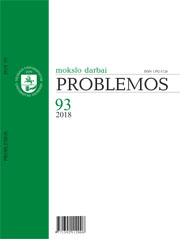E. HUSSERLIO EGOLOGINĖS SĄMONĖS SAMPRATOS KRITIKA E. VOEGELINO DARBUOSE
THE CRITIQUE OF E. HUSSERL’S NOTION OF EGOLOGICAL CONSCIOUSNESS IN E. VOEGELIN’S WORKS
Author(s): Dovydas CaturianasSubject(s): Political Philosophy, Social Philosophy, Human Ecology, Phenomenology
Published by: Vilniaus Universiteto Leidykla
Keywords: Voegelin; Husserl; egological consciousness; intentionality of consciousness; value demonism;
Summary/Abstract: Nowhere in his works did Eric Voegelin connect in a more detailed way his critique of Husserl’s phenomenology to his later developed political philosophy. To fill this gap, the article deals with the critique of Husserl’s notion of egological consciousness in Voegelin’s collection of essays Anamnesis, as well as with the significance of this critique for Voegelin’s mature political philosophy, best represented by the “New Science of Politics” project. Based on this analysis, it is claimed that the realisation of the limitation of egological consciousness’ contexts, and transcending this limitation meant in Voegelin’s philosophy a fundamental precondition for the restoration of the classical political science. Experiences having non-objective, nonintentional (in the Husserlian sense)structure, as well as their explication in Voegelin’s political philosophy was the source for the principles ensuring stable social and political order, at the same time providing opportunity to overcome the so called “value demonism” in social sciences.
Journal: Problemos
- Issue Year: 2018
- Issue No: 93
- Page Range: 114-128
- Page Count: 15
- Language: Lithuanian

